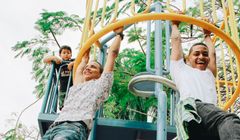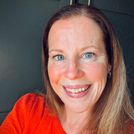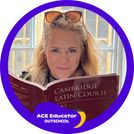Learner-centered homeschooling: SEA founder’s homeschool journey
The founder of Secular, Eclectic, Academic Homeschoolers shares why she homeschooled and why she's passionate about learner-centered education.
Editor’s note: today, we’re thrilled to share a guest post from the founder of Secular, Eclectic, Academic Homeschoolers (SEA Homeschoolers), Blair Lee. SEA is “a large, diverse, international community of secular homeschoolers.” SEA is also a key partner of Outschool, and we are consistently amazed by their dedication to the homeschool community and the quality of their resources.
Blair is a celebrated writer and author of 14 books. She is a curriculum developer, consultant, speaker, former college professor, and more. As if that weren’t enough, Blair holds a BS in Biology and an MS in Chemistry. We were dying to hear Blair’s homeschooling story and what she learned along the way.
Secular, Eclectic, Academic Homeschoolers founder Blair Lee's homeschool story
For homeschooling parents, this time of year is full of promise and nerves. Even if you do school year-round, the summer is a time of planning, finding new curriculum, and choosing new online classes. It’s the time when homeschoolers are focused on the possibilities and dreams of what our children's learning could look like in the coming year.
The nerves come from all the "what ifs." What if I don't get it right?
What if the curriculum I chose is a poor fit? What if, because of the choices I make for my child, they cannot get into college or the job they want or…what if?
For me, the "what ifs" have been put to rest now that my child is grown. Here is the story of how I homeschooled my son from first grade to college.
When my son was young, I thought about homeschooling but was plagued by "what ifs." So, I put him into kindergarten. It was his teacher who gave me the confidence to homeschool when she asked why I wasn't. Shored by her belief in me, I decided to homeschool first grade.
How hard could homeschooling be, anyway? When I started homeschooling, I already had teaching experience. That helped with my confidence. I had taught science at the college level. I volunteered in a 3rd and 4th-grade program working with students labeled as underachievers based on their test scores. I had also taken several classes through a teacher education program.
I felt prepared...sort of.
After all, this was my child, and the responsibility of educating him felt daunting. You might think I'm going to tell you that the first year was great. And it was, sometimes. From my standpoint, as the facilitator of my son's education, it was only "okay." I had my moments where I really shined, but the rest of the time, I had a lot to learn.
Teaching your children is a learning curve
The thing nobody tells you is that homeschooling has a learning curve. When we start homeschooling, we should spend time focused on learning how to do it in a way that is kind and thoughtful to ourselves. Too often, we get swept away in choosing a curriculum without thinking about the teacher (us) involved in implementing it.
And while homeschooling inherently focuses on the student, it is important to recognize that any learning situation must also take into account the person facilitating that education. Think about the best and worst teachers you have had and how they affected the subjects you learned from them, and you know this is true.
I am not trying to dissuade those who are nervous about homeschooling. Those nerves are completely normal. The truth is, for many of us, they don’t completely go away until the end of our homeschooling journey.
What I hope you get from my story is the number one rule of homeschooling, the rule no one talks about: you will be learning on the job. You will be learning how to become an educator at the same time your children are learning language arts, math, science, and history.
A handcrafted education
Between first and second grade, I spent time thinking about and analyzing the job I had done the year before. I was fair and honest, and my reflections led to a paradigm shift.
I realized that homeschooling, at its best, focuses on handcrafting an education that meets the learner's unique strengths, challenges, and passions.
I came to understand there is no one best way to educate all students. By focusing on the individual, you honor how the learner's unique brain works. It's empowering for both the learner and the person facilitating their learning.
These realizations were liberating. I stopped comparing the job I was doing with others. I stopped holding my son's learning to an arbitrary standard. Instead, I worked to embrace how he learned.
I scaffolded him when he needed it and let him soar when he leaped ahead. I came to value those subjects he was fascinated by, even if I wasn't. Through valuing his unique intellect, I hoped to give him the tools to "do what he wanted to with his one wild and precious life," as Mary Oliver so eloquently put it.
Getting to know your child as a learner
To give your child a learner-centered, handcrafted education, you need to get to know how they learn. Ask yourself:
How does my child access information?
What are their primary learning modalities?
What learning skills should they be working on?
These skills can be academic. They can also be executive functioning skills.
Figuring out the answers to these questions takes time. It made me nervous to take a nontraditional path, and at times I felt like I was taking a step into the unknown and trusting where I would land; but I made the time to figure it out.
I realized I could embrace alternatives while staying academic.
Second grade went way better for us than first grade did. In addition, my son loves camping, hiking, skiing, and mountain biking, and homeschooling allowed us the time for those passions and time to travel. We lived in a small town where he had lots of friends.
From third grade to fifth grade, my biggest concern each year was how to find the materials, programs, and online classes that would best meet my son's needs.
Homeschooling after a complex concussion
Then, in early February 2011, I watched as my son had a major accident during a skiing competition. It was terrible. But his helmet saved his life.
The accident would change our lives and our homeschooling journey because it changed how his brain accessed information.
When I met with the doctor, he told me that my son needed to rest his brain to fully heal. He recommended my son take off the rest of the school year. We spent the months between February and September letting his brain heal, which it did. It was a tough and lonely time.
I'll be honest, I worried about my son taking that much time off from schooling. Still, the difference in his short-term memory and ability to think through anything academic was dramatically different after his complex concussion.
I was more scared than worried, however. In addition to the new learning challenges, my son was plagued with headaches, fatigue, and angry mood swings. Finally, in the summer of 2011, my son was back to his sunny self. The headaches were gone, and the cognitive issues were back to normal.
That is, until he hit his head a second time in 2012.
If it were not his second concussion, it’s unlikely it would have been a complex concussion. But it was. This second complex concussion led to years of academic, emotional, and medical issues. It was not until my son was 17 that his headaches stopped. As you can imagine, I got him the medical help he needed through all of this.
I also kept homeschooling him. Though we changed the specifics of what we did, the focus on a learner-centered education did not.
It was even more important now because how my learner accessed information–his strengths and challenges–had all changed.
I had been focused on honing my learner-centered teaching skills for most of our homeschool journey, but our new situation brought it home to me in a new way.
For example, does it really matter how long or quickly it takes to learn something, as long as it is learned? So many schedules are arbitrary.
One of the tasks my son needed to work on was something I call "rerouting." A neurologist explained it to me like this:
Think of the way you normally access information like a highway. If there is a major accident on your way home, your regular road will be closed, so you take side streets. You'll be unfamiliar with this new route the first time you use it, which slows down the driving time. But the more you take the new path, the faster and more efficient you become.
This process is similar to how brains reroute as they establish new neural pathways. It starts slow and can require thinking about your thinking. Eventually, the brain uses this path automatically without you having to think about it.
Rerouting was a major focus for several years. It brought home to me the importance of focusing on the learner in a way that is honest about how they learn, and not stressing too much if they are above or behind their peers.
But this doesn't mean I eschewed academics, nor did my son want me to. We embraced them with an eclectic, innovative focus that met his needs and goals.
I didn't do it alone
I reached out and got help from others, including medical specialists. I joined, and even founded, homeschooling groups. Because I understood how my child learned, I could ask very specific questions when looking for advice and support from my fellow homeschoolers. I studied books on how learning works and attended homeschool conferences.
I also outsourced some of my son's learning.
Outsourcing certain subjects to other teachers added depth and breadth to my son's education. It also helped me to have these educators to talk to about how my son was doing academically. My son and I needed this input and support in middle school and high school.
Outschool wasn’t around until the end of our homeschool journey, although a couple of his favorite teachers, like Thomas Jones, now teach on the platform. These teachers were an important part of my son's education.
I will never forget laying on the sofa listening while my son was in an online class. I could hear the high-level discussion the students, including my son, were having with the instructor's guidance. That was the first time in several years that I really knew my son was going to be okay. I hope stories like mine give you the confidence to overcome your own "what ifs." May you be gracious with your learning curve and have the courage to let go of comparisons and focus on how your kids learn best.
About Blair Lee
Blair is the founder of Secular, Eclectic, Academic Homeschoolers and SEA Publishing. She writes concept-rich, hands-on courses, including The Science of Climate Change and Microbiology. She is the primary author of the critically acclaimed REAL Science Odyssey Series and co-author of Project-Based Learning: Creating a Modern Education of Curiosity, Innovation, and Impact.
She has been involved in science education for over two decades, first as a community college professor and second as a curriculum developer. Blair is a passionate advocate of innovative academics, where the focus is on how subjects are best learned. Through her speaking and writing, her goal is to empower homeschooling educators to dare to be innovative and create something unique and academically rich for their student’s education.

Topics Related to Homeschool
Similar Homeschool articles
Homeschool classes







1-on-1 Tutoring


1-on-1 Tutoring
